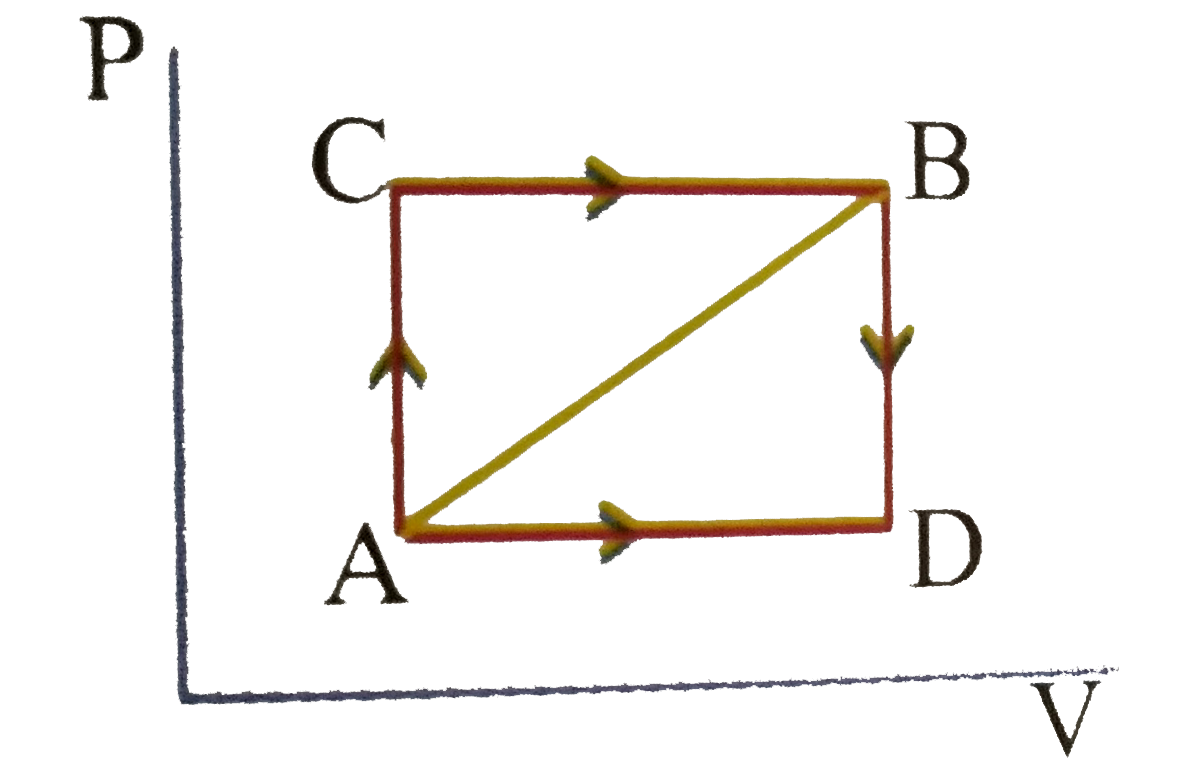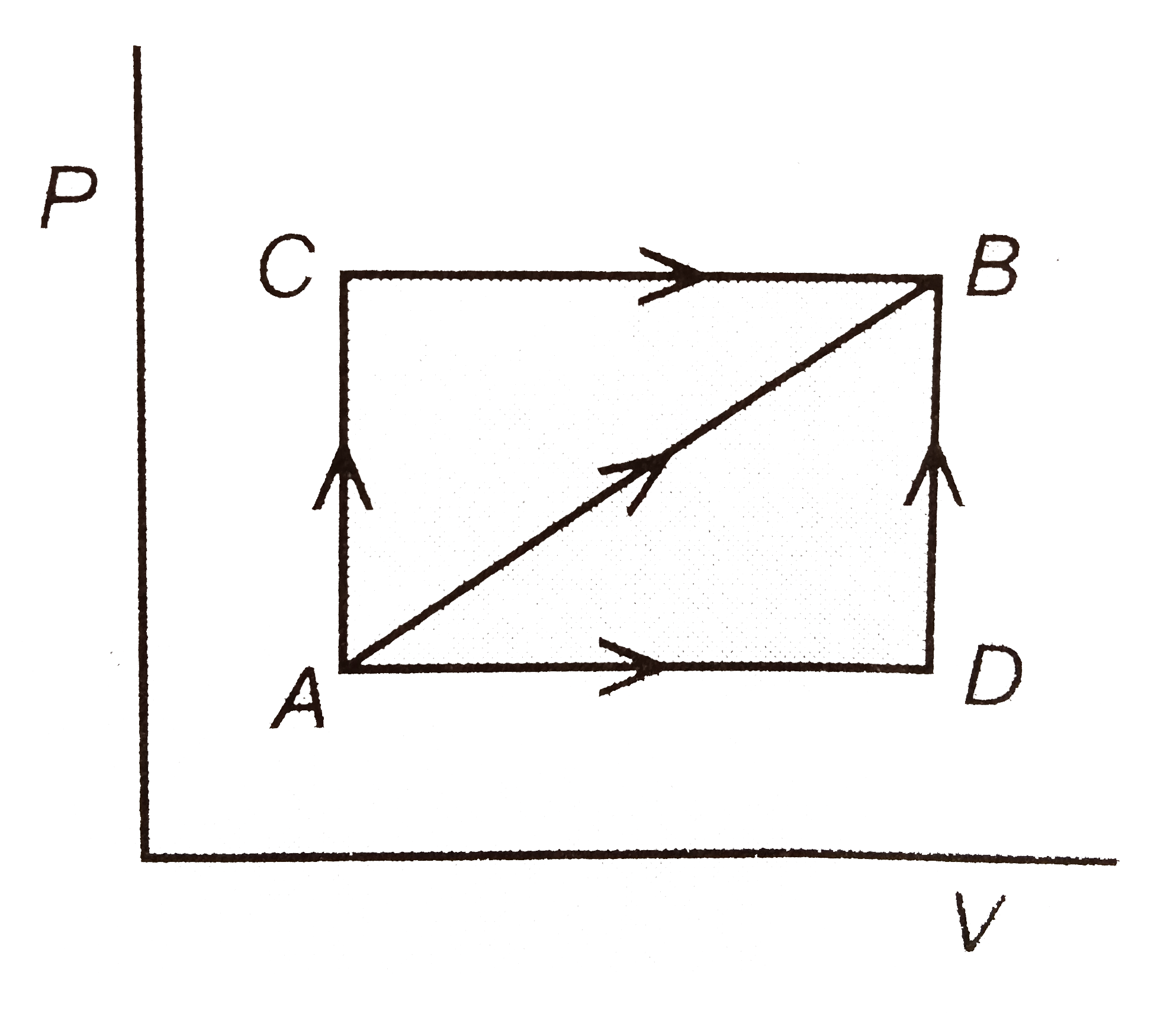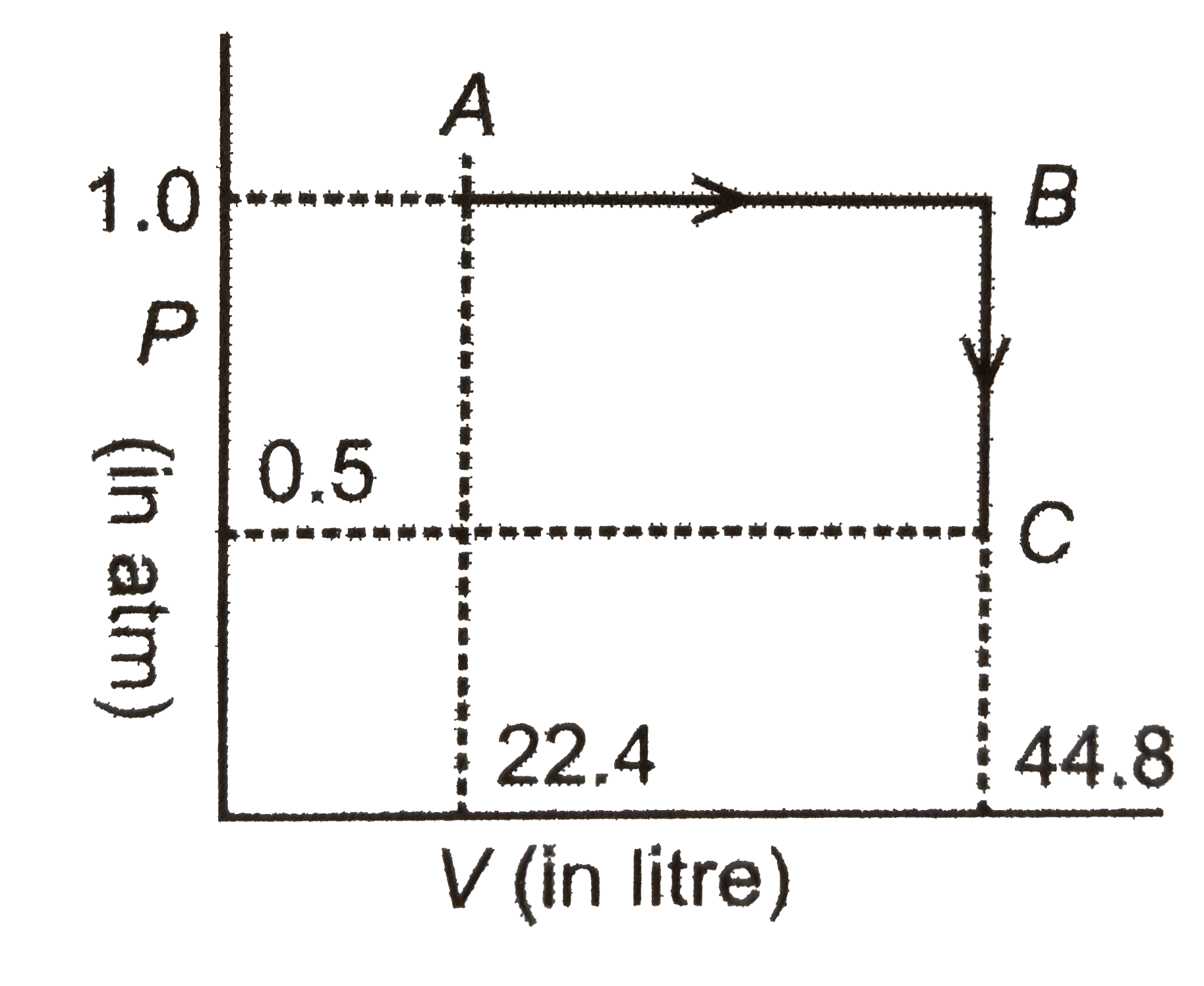The first law thermodynamics was gives as , where q is heat given to a system and represent increase in internal energy and -w is work done by the system. Various process such as isothermal, adiabatic, cyclic, isobaric and isochoric process in terms to first law of thermodynamics leads for important results. The molar heat capacity for 1 mole of monoatomic gas is 3/2R at constant volume and 5/2R at constant pressure.
A system is allowed to move from state A to B following path ACB by absorbing 80 J of heat energy. The work done by the system is 30 J. The work done by the system in reaching state B from A is 10 J through path ADB which statements are correct :

1. Increase in internal energy from state A to state B is 50 J.
2. If path ADB is followed to reach state B.
3. If work done by the system in path AB is 20 J, the heat absorbed during path AB = 70 J.
4. The value is equal to .
5. Heat absorbed by the system to reach B from A through path ADB is 60 J.
1, 5
1, 3,5
1, 2,3,5
1, 4,5
The correct Answer is:C
Heat absorbed 80J. Work done by the system Also
Topper's Solved these Questions
- BOOK - NARAYNACHAPTER - THERMODYNAMICSEXERCISE - Level-VI150videos
THERMODYNAMICS
- BOOK - NARAYNACHAPTER - THERMODYNAMICSEXERCISE - Passages13videos
THERMODYNAMICS
- BOOK - NARAYNACHAPTER - THERMODYNAMICSEXERCISE - Level-II (H.W)24videos
THERMODYNAMICS
- BOOK - NARAYNACHAPTER - STRUCTURE OF ATOMEXERCISE - EXERCISE - IV EXEMPLAR PROBLEMS24videos
STRUCTURE OF ATOM
Similar Questions
Knowledge Check
- Question 1 - Select One
The first law thermodynamics was gives as q=ΔU+(−w), where q is heat given to a system and ΔU represent increase in internal energy and -w is work done by the system. Various process such as isothermal, adiabatic, cyclic, isobaric and isochoric process in terms to first law of thermodynamics leads for important results. The molar heat capacity for 1 mole of monoatomic gas is 3/2R at constant volume and 5/2R at constant pressure.
Which of the following statements are correct:ABoth work done heat appears at the boundaries of systemBHeat given to a system is given +ve sign.CHeat given to a system is equal to increase in internal energy under isothermal conditionsDHeat given to a system is used to increase internal energy under isochoric conditions - Question 2 - Select One
The first law of thermodynamics was given as q=ΔU+(−w), where q is heat given to a system and ΔU represents increase in internal energy and −w is work done by the system. Various processes such as isothermal, adiabatic, cyclic, isobaric and isochoric process in terms of I law of thermodynamics leads for important results. The molar heat capacity for 1 mole of monoatomic gas is 32R at constant volume and 52R at constant pressure.
A system is allowed to move from state A to B following path ACB by absorbing 80J of heat energy. The work done by the system is 30J. The work done by the system in reaching state B from A is 10J through path ADB,
 Which statements are correct?
Which statements are correct?
(1) Increase in internal energy from state A to state B is 50J. (2) If path ADB is followed to reach state B,ΔU=50J. (3) If work done by the system in path AB is 20J, the heat absorbed during path AB=70J. (4) The value UC−UA is equal to UD−UB. (5) Heat absorbed by the system to reach B from A through path ADB is 60J.A1,5B1,3,5C1,2,3,5D1,4,5 - Question 3 - Select One
The first law of thermodynamics was given as q=ΔU+(−w), where q is heat given to a system and ΔU represents increase in internal energy and −w is work done by the system. Various processes such as isothermal, adiabatic, cyclic, isobaric and isochoric process in terms of I law of thermodynamics leads for important results. The molar heat capacity for 1 mole of monoatomic gas is 32R at constant volume and 52R at constant pressure.
1 mole of a monoatomic gas is expanded through path ABC as shown in figure:
 select the correct statements:AIf specific heat of gas are 0.125 and 0.075cal/g the mol. Wt of gas =40BTemperature at point A,B,C are 273,546 and 273K respectively.CBoth A and BDNone of these
select the correct statements:AIf specific heat of gas are 0.125 and 0.075cal/g the mol. Wt of gas =40BTemperature at point A,B,C are 273,546 and 273K respectively.CBoth A and BDNone of these
The first law of thermodynamics was given as q=ΔU+(−w), where q is heat given to a system and ΔU represents increase in internal energy and −w is work done by the system. Various processes such as isothermal, adiabatic, cyclic, isobaric and isochoric process in terms of I law of thermodynamics leads for important results. The molar heat capacity for 1 mole of monoatomic gas is 32R at constant volume and 52R at constant pressure.
Which of the following statements are correct? (1) Both work and heat appears at the boundaries of system. (2) Heat given to a system is given +ve sign. (3) Heat given to a system is equal to increase in internal energy under isothermal conditions (4) Heat given to a system is used to increase internal energy under isochoric conditions (5) Both work and heat are not state functions but their sum (q+w) is state function.View SolutionIf ΔU and ΔW represent the increase in internal energy and work done by the system respectively in a thermodynamical process, which of the following is true ?
View SolutionIf ΔU and ΔW represent the increase in internal energy and work done by the system resectively in a thermodynamical process, which of the following is true?
View SolutionIf ΔU and ΔW represent the increase in internal energy and work done by the system resectively in a thermodynamical process, which of the following is true?
View SolutionIf q=ΔU− by first law of thermodynamics then for an adiabatic process
View Solution

